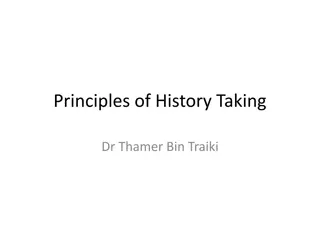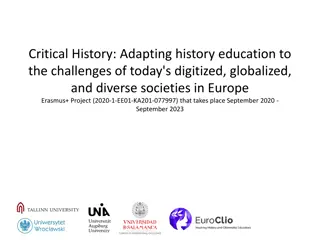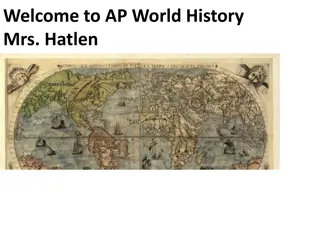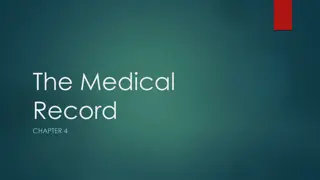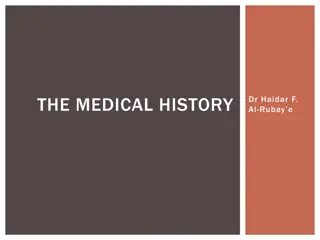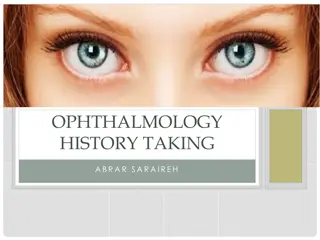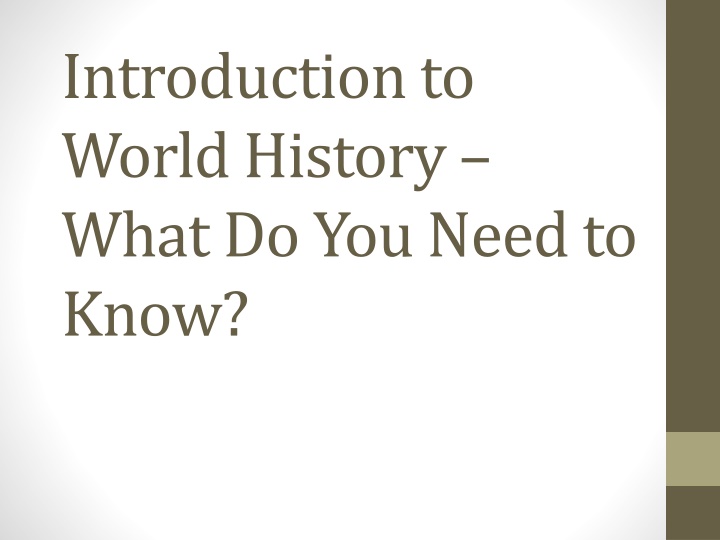
Exploring the Significance of Studying World History in Education
Uncover the importance of studying world history in education through understanding the past, critical thinking skills, multiple perspectives, and historical sources. Discover historiography, different historical sources, and the value of analyzing various perspectives.
Uploaded on | 0 Views
Download Presentation

Please find below an Image/Link to download the presentation.
The content on the website is provided AS IS for your information and personal use only. It may not be sold, licensed, or shared on other websites without obtaining consent from the author. If you encounter any issues during the download, it is possible that the publisher has removed the file from their server.
You are allowed to download the files provided on this website for personal or commercial use, subject to the condition that they are used lawfully. All files are the property of their respective owners.
The content on the website is provided AS IS for your information and personal use only. It may not be sold, licensed, or shared on other websites without obtaining consent from the author.
E N D
Presentation Transcript
Introduction to World History What Do You Need to Know?
DO-NOW Finish Tell Me About You handout from yesterday. If you finish, please brainstorm a list answering the following prompt: Why should we study history, in particular world history???
Why should we study history? After a few minutes, turn to your partner and discuss your responses. We will then share with the class. http://www.teachertube.com/viewVideo. php?video_id=191139&title=Why_Stud y_History_
1. Understanding the past is the key to understanding the present 2. It keeps us informed on current events as they unfold. 3. It helps us to appreciate multiple perspectives and interpretations. 4. Analyzing history strengthens our critical thinking skills. 5. It trains us to gather evidence and to find patterns and trends. 6. You can apply information from the past to analyze and solve problems in the present. 7. It gives us an understanding of other people and cultures. 8. It challenges us to think outside the box, and to be creative. 9. History gives us the excitement of discovery, and the reward of solving real world problems.
What do you think historiography means? Think for a minute and then we will discuss as a class.
Historia History Graphia (think biography)- writing Together = the study of historical writing! (like analyzing documents)
In order to do this We need to know the difference between various types of historical sources. What is a source? Now when thinking of sources
Sources Is there more than one account of history? Does the author make a difference when analyzing historical writing? What do you think it means to look at multiple perspectives when studying historical sources?
TASK think of various historical documents or books (sources). You may work with a partner. What are the similarities/differences?
Give some examples of what you came up with! Keep in mind who wrote the source you thought of and when was it written? This what we need to do in order to think like historians. We are doing historiography.
In summary. Example: Reading the Declaration of Independence would be much different than reading biographies of the Founding Fathers. Why?
ONE IS A PRIMARY SOURCE AND ONE IS A SECONDARY SOURCE!!!!
Whats the difference? Primary source = 1sthand account that was written during the actual time period. Secondary source = 2ndhand account that uses primary sources and at a later event than when the actual event took place. Declaration of Independence actually written in 1776 Biographies of Founding Fathers written years later by other people.
Looking at historical sources during the actual time period can give us a great insight into the minds of people at the time. We can look at different perspectives to come up with our own historical conclusions.
Please complete the worksheet that will be provided. Determine if the source is a primary or secondary source.
Go over Cheating, Plagiarism, and Collaboration

